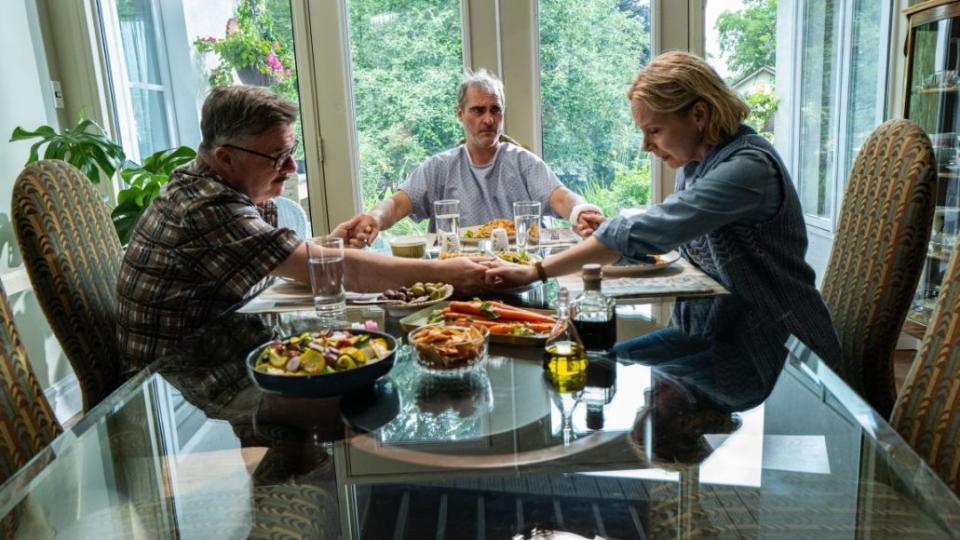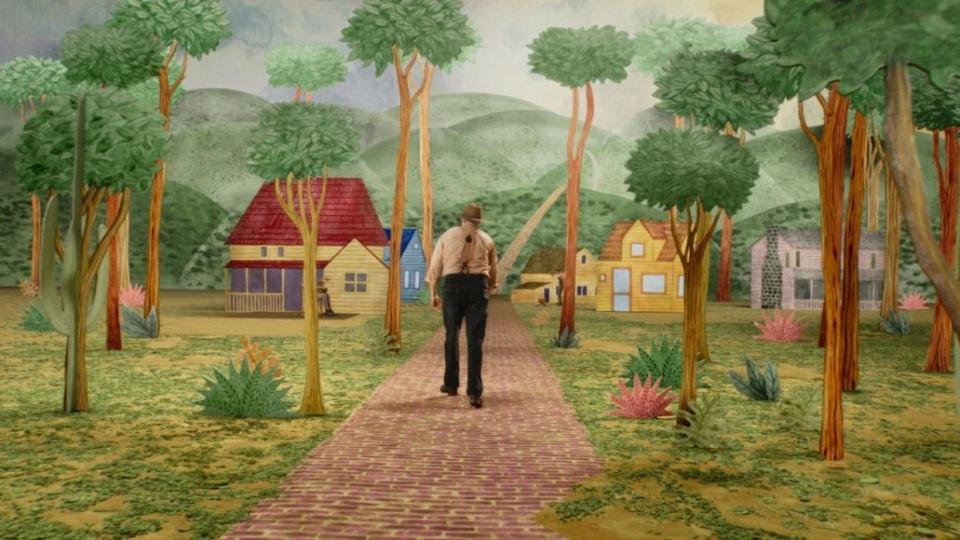Ari Aster Laments A Life Not Lived In His Kaufman-esque Odyssey Beau Is Afraid: Review
- Oops!Something went wrong.Please try again later.
- Oops!Something went wrong.Please try again later.
- Oops!Something went wrong.Please try again later.
The post Ari Aster Laments A Life Not Lived In His Kaufman-esque Odyssey Beau Is Afraid: Review appeared first on Consequence.
The Pitch: Beau (Joaquin Phoenix), simply put, has wasted his life. A timid, balding middle-aged man, he ekes out a meek existence in a crowded apartment in New York City, terrified of the mobs of junkies and murderers racing through the streets like a zombie horde. But his greatest fear, it seems, is the impending prospect of visiting his mother in upstate New York, despite the best efforts of his therapist (Stephen McKinley Henderson), who points out (apropos of nothing) that thoughts of killing his mother are “not uncommon.”
And, in the way that feels endemic to Beau’s life, he soon gets a traumatic but all-too-enticing reason to duck out of his visit: After an unexpected theft derails his plans, he asks his mother, over the phone, “What do you think I should do?”
“…It’s fine,” she responds. (Narrator: It wasn’t fine.)
For Mommy gets the last laugh — Beau gets a call the very next day that she’s dead, and he’s got to get there for the funeral as soon as possible. After all, it’s her express wish that she not be buried without Beau physically present. As per usual for Beau’s life (or at least the highly subjective glimpse Aster gives us), such a simple journey takes him on a nightmarish odyssey that will test the limits of his mind, his soul, and — most of all — his nerves.
Mommy Issues: A24 marquee name Ari Aster is usually synonymous with the hallmarks of what’s often referred to (sometimes derisively) as “A24 horror” — long, contemplative mood pieces that unveil their existential horrors through crisp framing and understated performances from A-list actors classing up the kind of stories that used to be comfortable under the lens of schlock. Beau Is Afraid is ostensibly Aster’s “comedy,” though it’s tinged with the same phantasmagoria as his previous efforts: Here, he’s stepping pretty visibly into Charlie Kaufman territory, using the language of cinema to externalize his deep-seated anxieties about his mother, his life, and every anxiety he’s ever had.
Speaking of which, Phoenix’s Beau is a tangled ball of them, as if “neurosis” were molded into clay and given life like a golem. The man is no stranger to playing closed-off weirdos; hell, he just won an Oscar a few years back for turning the Clown Prince of Crime into one. But he, with his noticeable paunch, shock of thinning white hair, and slack-jawed expression, spends the entire film constantly searching for solid emotional ground and finding nothing.
Beau’s is a tragic, pathetic existence: his sin is sloth, laziness, fear — or, as Henderson’s therapist jots down in his notebook, “guilty.” It’s that guilt, cultivated over years of what seems like overwhelming abuse by his mother (played impeccably by Zoe Lister-Jones in flashbacks to a younger Beau, and Patti Lupone in a late-film appearance that must be seen to be believed), that keeps him a docile, confused man who’s done nothing with his life. Phoenix’s performance is a tightly-coiled panic attack, one that embraces his character’s passivity and makes it compelling nonetheless.

Beau is Afraid (A24)
Of course, Aster’s world doesn’t make any progress easy — it’s a world in which every intrusive thought you’ve ever had comes to life, as character after character blames Beau for things he’s not responsible for. Whether it’s the happy-go-lucky suburban family (Amy Ryan and Nathan Lane, the latter hilariously referring to Beau as “m’dude”) who hit him with their car and put him in the world’s most passive-aggressive Misery situation, or the neighbor who slips ever more threatening notes under his door about loud music when he’s not playing anything, Aster continually reminds us of the little misunderstandings we feel we can never address without ruffling feathers. For Beau, those dilemmas are crippling, and we’re left to sit in that tightening discomfort right along with him.
The Wolf House: But even the most anxious among us yearn for a respite from our troubles, and Aster offers that halfway through, as Beau’s flight from his troubles (both of his own making and not) takes him into a folkloric journey through the woods. Eventually, his encounter with a traveling theatrical troupe leads him to imagine himself in a watercolored fantasia where he gets to imagine the humble, fulfilling life years of repression and doubt have denied him.
It’s rendered with bright pops of color and sweeping animation, courtesy of The Wolf House filmmakers Cristóbal León and Joaquín Cociña; if nothing else, even those who aren’t on Beau‘s wavelength will hopefully be inspired to check out their animated opus.
It should also be stressed that, despite Aster’s pedigree and the suffocating anxiety of the situations Beau finds himself in, Beau is Afraid is also deeply, bleakly funny. Fiona Crombie’s production design sits Beau in a ridiculous world of absurd posters and signs — a sex shop called Erectus Ejectus, a funeral catering company entitled Shiva Steve’s Grub for the Grieved — and the sheer volume of Beau’s misfortunes become funnier the taller they’re stacked. He’s both schlemiel and schlimazel, often in the same scene; Phoenix and Aster mine his patheticness and unstoppable misfortunes for every grim laugh they can.

Beau is Afraid (A24)
The Verdict: At three hours, it’s a lot to take in, and it’s easy to see where Aster’s auteurism tilts into self-indulgence — it’s a film about a man scared of everything, made by a man committed to showing us everything that scares him.
But Beau is Afraid is the kind of film that likely unfurls for the viewer upon multiple rewatches, spinning back through the nightmare logic and repeating motifs to trace the many ways parental trauma can forge our greatest flaws. It’s a huge, huge swing, and Aster skeptics will likely scoff at the egotism of it all. But for those of us who’ve been at the receiving end of a classic Jewish-mother guilt trip, Beau is Afraid will serve as affirmation, cinematic therapy, and the most relatably terrifying thing they’ve ever seen.
It’s too early to say whether this is Aster’s best film — both in his career and with the film so fresh in this reviewer’s mind. Still, it’s certainly his most ambitious, using the tools of terror he’s cultivated thus far to eke existential horror out of more universal humanistic impulses. All I’ll say is, I hope he and his mother are getting along these days.
Whereto Watch: Beau Is Afraid begins the long, long road home to theaters in limited release on April 14th, before its wide release on April 21st.
Trailer:
Ari Aster Laments A Life Not Lived In His Kaufman-esque Odyssey Beau Is Afraid: Review
Clint Worthington
Popular Posts

